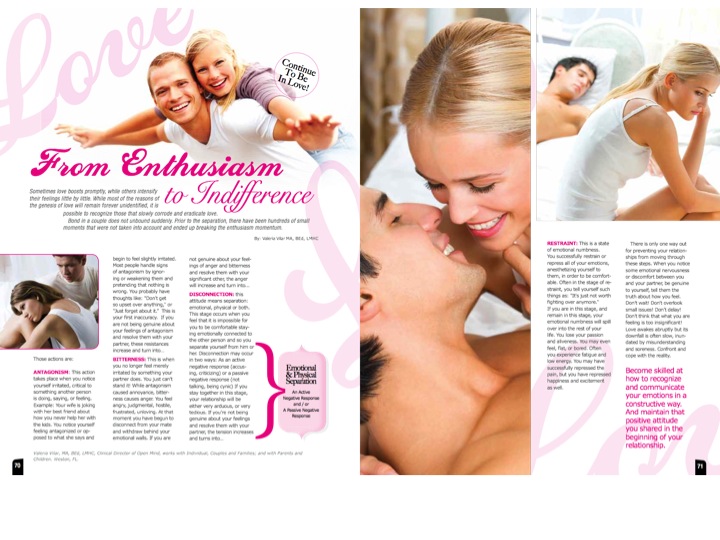From Enthusiasm to Indiference

From Enthusiasm to Indifference

By Valeria Vilar, MA, BEd, LMHC
Sometimes love boost promptly. Others intensifies their feelings little by little. While most of the reasons of the genesis of love will remain forever unidentified, it is possible to recognize those that slowly corrode and eradicate love.
Bond in a couple does not unbound suddenly. Previous the separation there have been always hundreds of small moments that were not taken into account and ended up breaking the enthusiasm back. Those actions are:
Antagonism: This action takes place when you notice yourself irritated, critical to something another person is doing, saying, or feeling. Example: Your wife is joking with her best friend about how you never help her with the kids. You notice yourself feeling antagonized or opposed to what she says and a slight irritated.
Most people handle signs of antagonism by ignoring or weaken them and pretending nothing is wrong. You probably have thoughts like: "Don't get so upset over anything," or "Just forget about it”. This is your first inaccuracy. If you don't be genuine about your feelings of antagonism and resolve them with your couple, these resistances increase and turn into…
Bitterness: is when you no longer feel merely irritated by something your partner does, you just can't stand it! While antagonism caused annoyance, bitterness causes anger. You feel angry, judgmental, hostile, frustrated, unloving. At that moment you have begun to disconnect from your couple and withdraw behind your emotional walls. If you don't be genuine about your feelings of anger and bitterness and resolve them with your couple, the anger increase and turns into...
Disconnection, this attitude means separation: emotional, physical, or both. This stage occurs when you feel that it is impossible for you to be comfortable staying emotionally connected to the other person, and so you separate yourself from him or her. Disconnection may occur in two ways: As an active negative response (accusing, criticizing,) or a passive negative response (not talking, being cynic...) If you stay together in this stage, your relationship will be either very arduous, or very tedious. If you don't be genuine about your feelings and resolve them with your couple, the tension increase and turns into…
Restraint is a state of emotional numbness. You successfully restrain or repress all of your emotions, anesthetizing yourself to them in order to be comfortable. Often in the stage of restraint, you tell yourself such things as: "It's just not worth fighting over anymore."
If you are in this stage your emotional numbness will spill over into the rest of your life. You lose your passion and aliveness. You may feel even, flat, or bored. Often you experience fatigue and low energy. You may have successfully repressed the pain, but you have repressed happiness and excitement as well.
There is only one way out for preventing your relationships from moving through these steps. When you notice some emotional nervousness or discomfort between you and your couple, be genuine to yourself; tell the complete truth about how you feel. Don't wait! Don't overlook small issues! Don’t delay! Don't think that what you are feeling is too insignificant! Love awakes abruptly but its downfall often slow, inundated by misunderstanding and soreness. Confront and cope with the reality. Become skilled at how to recognize and communicate your emotions in a constructive way.
Valeria Vilar, MA, BEd, LMHC, is the Clinical Director of Open Mind Psychotherapy & Wellness Center. The center is located at the Weston Town Center since 1998. She works with individuals, children, adolescents, adults, couples and families. Additional information, can be reached at (954) 385-9550, and This email address is being protected from spambots. You need JavaScript enabled to view it. or by visiting www.openmind.cc


